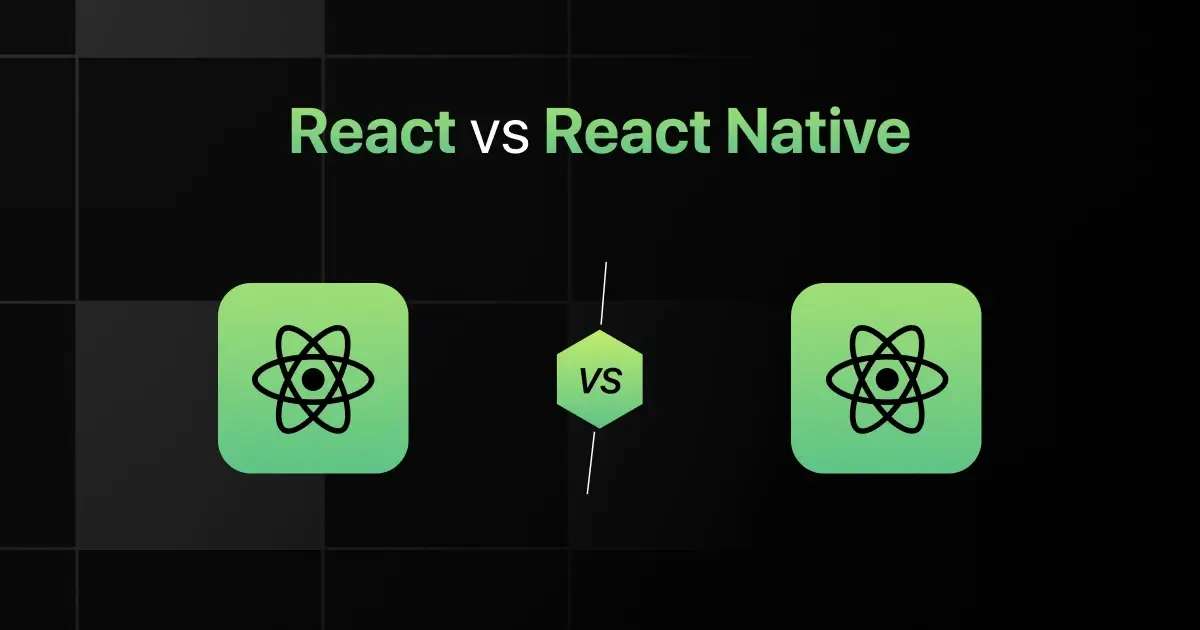React vs React Native: Key Differences

When comparing React and React Native, it’s important to look at what sets them apart. The discussion about React vs React Native is common among developers deciding which framework to use for their projects.
The question of React vs React Native which is better? or React vs React Native which is best? depends on what you need for your specific project.
In this article, let’s know the differences between React and React Native.
React vs React Native: Understanding the Key Differences
When comparing React and React Native, it’s crucial to understand the key distinctions that define their usage and capabilities.
One of the most important differences is that React is a JavaScript library for building user interfaces primarily for web applications, whereas React Native is a framework for developing native-style apps for mobile platforms using the same design as React.
The following are other major differences between React and React Native:
| S. No. | Parameters | React | React Native |
|---|---|---|---|
| 1 | Developed By | Facebook (now Meta) | Facebook (now Meta) |
| 2 | Release Year | 2013 | 2015 |
| 3 | Paradigm | Declarative UI for web applications | Declarative UI for mobile applications |
| 4 | Syntax | JSX (JavaScript XML) | Similar to React, uses JSX |
| 5 | Performance | High performance in web environments | High performance on mobile devices |
| 6 | Applications and Use Cases | Web applications | iOS and Android native mobile apps |
| 7 | Learning Curve | Moderate, depends on JavaScript knowledge | Slightly steeper due to native components |
| 8 | Libraries and Frameworks | Extensive ecosystem for web | Specific to mobile, but growing |
| 9 | Platform Independence | Browser-based platforms | iOS, Android, and recently Windows & macOS via extensions |
| 10 | Concurrency and Multithreading | Managed by the browser's JavaScript engine | Handled through native threads and bridges |
| 11 | Tooling and IDE Support | Wide range of tools and extensions | Supported by most tools that support React |
| 12 | Memory Management | Managed by the JavaScript engine | Managed by the native platforms |
| 13 | Error Handling | Robust, with tools for handling in development and production | Similar to React with additional considerations for native errors |
| 14 | Security | Depends on web standards | Depends on both web and mobile security practices |
| 15 | Scalability | Scalable with proper architecture | Scalable, especially with native code integration |
| 16 | Key Features | Virtual DOM, component-based architecture | Access to native functionality, reuse of code across web and mobile |
| 17 | Integration with Other Technologies | Integrates well with other web technologies | Integrates with native APIs and components |
| 18 | Community and Support | Extremely large and active | Large and growing, supported by extensive documentation |
| 19 | Job Opportunities | High demand in web development | High demand in mobile app development |
| 20 | Future Prospects | Continues to evolve with web standards | Expanding in the cross-platform mobile development space |
React vs React Native: Which One to Choose?
Choosing between React and React Native can be challenging, but by understanding their distinct advantages, you can make an informed decision.
Choose React If:
- You are focused on building dynamic and responsive web applications, especially those requiring sophisticated user interfaces and high user interaction.
- You value a library that offers a vast ecosystem of tools and extensions, enhancing your ability to build complex, scalable web applications quickly and efficiently.
- You need a solution known for its performance in rendering and updating user interfaces, utilizing a virtual DOM to optimize changes and updates, making it ideal for high-performance web apps.
- You seek a technology that integrates well with other libraries and frameworks, allowing you to customize your tech stack to fit the specific needs of your project.
- You focus on web development projects that benefit from a component-based architecture, where reusable components enhance development speed and consistency across large applications.
Choose React Native If:
- You aim to develop cross-platform mobile applications that run on both iOS and Android from a single codebase, leveraging your JavaScript and React skills.
- You appreciate a framework that allows for the development of applications that feel native to each platform, providing access to native functionalities like the camera and location services.
- You need a mobile development framework that supports hot reloading, which significantly speeds up development time by allowing you to see changes instantly without recompiling.
- You seek to benefit from the community and ecosystem of React while applying these advantages to mobile app development, utilizing a wide range of plugins and extensions designed specifically for mobile.
- You focus on projects that require a quick go-to-market strategy for mobile apps, where the ability to share code between web and mobile platforms can reduce development time and effort.
Final Words
The main difference between React and React Native lies in their design and use.
The purpose of understanding the React vs React Native difference is to choose the right tool for the job, depending on factors like the project’s scope and the target platform.
Frequently Asked Questions
1. What are the key differences between React and React Native?
The key differences between React and React Native are:
- React is a JavaScript library for building user interfaces for web browsers; React Native is a framework for building native mobile apps using React.
- React uses web components; React Native uses native components that compile to platform-specific UI.
- React works in the DOM (Document Object Model); React Native uses a virtual DOM to render to native views.
- React relies on CSS for styling; React Native uses JavaScript-based styling similar to CSS.
2. Which is better React or React Native? Which one to choose?
The choice between React and React Native depends on the target platform. Choose React for web applications and React Native for mobile applications.
3. Which is faster, React or React Native?
React is faster in web environments, while React Native provides near-native performance on mobile.
4. What are the primary use cases of React and React Native?
- React is primarily used for building dynamic high-performance web applications
- React Native is used for developing cross-platform mobile apps with a native feel.
5. Which one is easy to learn for Beginners, React or React Native?
React is easy to learn for beginners, especially those with a background in web development, as it has fewer platform-specific quirks than React Native.
6. Can React and React Native run on different platforms?
Yes. React runs on web platforms, while React Native supports iOS, Android, and recently Windows and macOS through extensions.
7. Can I develop mobile apps using React and React Native?
Yes. Mobile apps can be developed using React Native, while React can be used for web apps that are mobile-friendly but not truly native.
8. What are the job prospects for React developers versus React Native developers?
Both React and React Native developers are in high demand; React developers typically find opportunities in web development, while React Native developers are sought after in mobile app development sectors.
Explore More React Resources
Explore More React Native Resources
Explore More Comparisons
Related Posts


Best Apps to Learn Web Development
Ever thought about building your own website or launching a career in tech but don’t know where to start? With the …










